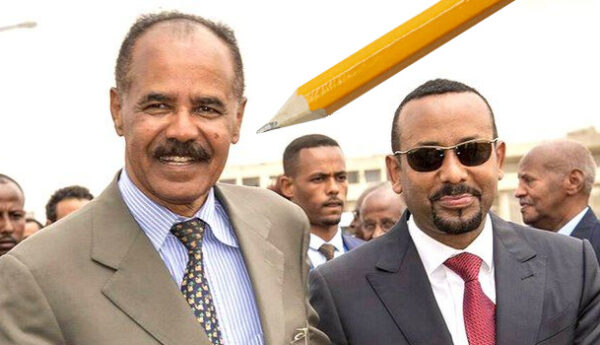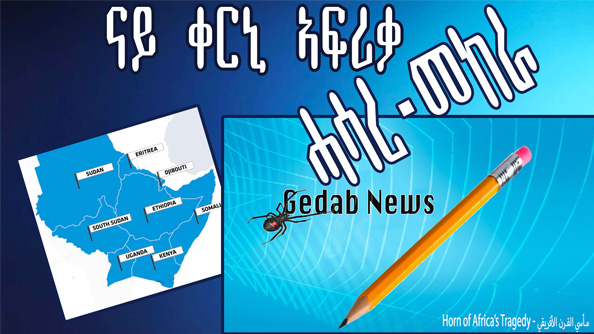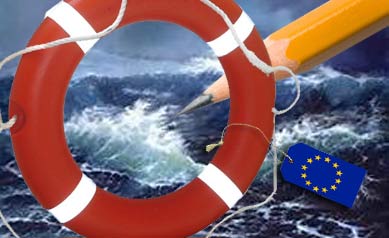Practice Diversity, Don’t Preach It
 Do the Eritrean regime’s policies impact all Eritrean segments equally or are they, depending on the policy, impacting one segment more disproportionately than others? If this is the case, is it intentionally so? And, whether it is so or not, is it prudent politics to discuss it or it is just a distraction that will weaken Eritrea’s already weak opposition?
Do the Eritrean regime’s policies impact all Eritrean segments equally or are they, depending on the policy, impacting one segment more disproportionately than others? If this is the case, is it intentionally so? And, whether it is so or not, is it prudent politics to discuss it or it is just a distraction that will weaken Eritrea’s already weak opposition?
Every time we host an article that is provocative or taboo-busting, people—including good people—may have honest differences on where our views end and those of the writers begin. What do we, as publishers and advocates, believe in? This is what we hope to address today.
The first question—whether the regime’s policy has disproportionate impact on different segments—is easy to answer. All people have to do to stop being squeamish is to expand the list from highland/lowland, Christian/Muslim to incorporate other non-taboo polarities—young/old, urban/rural, farmer/merchant, male/female—and the answers will be clear, once they begin reviewing the regime’s policies.
Here is a reminder of the policies:
The Eritrean regime has a land policy of “land belongs to the State”; a language policy of “all languages are equal”; a refugee resettlement policy of telling the world’s refugee authority “give us money with no strings”; an education policy of using military camps as high schools; a conscription policy of raiding urban centers; a foreign policy that relies on meddling on the affairs of others and regular use of the armed forces; an economic policy that is based on Diaspora remittance; a religious policy of antagonizing the “new religions” and harassing the old; a national security policy of banning any grouping of more than 7 individuals; an immigration policy that makes legal migration unthinkable; a housing policy which uses houses as a cash crop instead of a means to alleviate housing shortages; a trade policy that makes the government a direct competitor to the merchant, the fisherman and the farmer…
Those who say that these policies affect all Eritrean segments equally are either being disingenuous or are ignorant of the policies. The housing policy favors the rich over the poor (it is a spoils system for the Diaspora Eritreans); the education policy favors males over females (the military has always appealed to men more than women); the conscription policy favors the rural folk over the urban folk (consider the huge sweeps); etc. This is self-evident. What is also clear is that some subjects are open for discussion: for example, the fact that the education system in Eritrea badly serves females is acknowledged by even the government, as it is part of its Millenium Development Goals (MDG) report. The Eritrean regime and its supporters also have no reservations in admitting that its policies are designed to place the priorities of rural citizens over urban citizens. The objection, it appears, is to discussing policies that may have disparate impact on different ethnic, regional or religious groups.
Skipping over whether the regime’s disparate treatment is intentional or not (which makes no difference to the groups affected), this leads us to the next question: even if it is true, is it a good idea to discuss it now? Won’t this weaken the opposition and splinter it further?
While we appreciate the well intentions of people who fear that, in the wrong hands, these issues tend to generate more heat than light, we think it is misguided to declare these issues taboos that should be avoided. It is one thing (and entirely appropriate) for people to insist that these issues should be handled with care, responsibly and that alternative viewpoints should be presented. It is quite another to throw temper tantrums and fits because the views expressed are in violation of some dogma or orthodoxy that some organizations claim to adhere to (but do not practice.) In this regard, we would like to mention two important points as they relate to awate.com. It is hard to do this without appearing to be bragging or indulging in self-praise but sometimes it is necessary to point out the obvious:
1. Diversity: This website cannot possibly receive lectures on diversity and how to maintain it from any Eritrean organization—be it government, non-government, opposition, independent, or confused—simply because it has the most diverse group of writers, readers and supporters than any other Eritrean organization. Period.
Take a look at the membership of the PFDJ, the membership of every Eritrean opposition group, and the support base and the writers of Eritrean websites—government, opposition, independent and confused alike. And then compare them to our writers, supporters and donors and it is not even close. Awate.com has succeeded where everyone else has failed: it reflects the entire spectrum of Eritrea. They don’t. We are sorry if this appears rude or insulting, but facts must be pointed out. This being the case, we find it a bit rich to receive lectures on diversity from individuals whose circle of friends is no different from that of their immediate families.
So far, there have been two reactions to the diversity of this website. Those who are intellectually honest have, over the years, grudgingly admitted that this is indeed the case. Those who are dishonest have attempted to describe this website as Islamist or pro-ELF, etc, in a futile effort to marginalize it. They believe that if the executive of an institution is a Muslim then, by definition, it cannot be progressive, modern, or secular but must be a closeted or declared jihadist, Islamist, separatist, tibalist institution. They have been doing it to us since 2000 (borrowing language straight from the pages of Nihnan Elamanan by the way) and their routine failures do not seem to have dissuaded or discouraged them. On the contrary, they have developed a strange addiction to failure. Well, every age must bring out its Sisyphus who love rolling up a rock up a hill only to see it rolling down, and why should we deny them their hobby?
2. Freedom of Speech: This website (and asmarino.com) are the only two media outlets that publish opinions they do not necessarily agree with. You will not find this in the government websites, in the opposition websites and in the confused websites.
This is why many of our critics assume that articles which we publish are those which wear our imprint or approval.
The fact is that the only thing we are looking for in an article is that it express a point of view, hopefully intelligently, and that it not be a retread which has already been, or will be, published elsewhere.
Those who are intellectually honest will admit, even if grudgingly, that this website hosts some of the more intelligent, more original, more provocative, more insightful commentary that is to be found in the Eritrean media.
DIVERSITY IS EVERYTHING
So we believe in informing, emboldening, inspiring and reconciling our people, and you know that. We believe in freedom of speech and in the importance of advocating diversity. What is our policy on diversity?
Well, we could write an entire program and bullet points but a good friend of this website (and one of our regular advisors), Semere Tesfamariam, has articulated a view that summarizes what we believe:
“We can start finishing the unfinished business by refusing to be part of anything that does not mirror Eritrea’s diversity. We need to categorically reject any organization that does not look like Eritrea.”
By “reject” Semere does not mean that we should outlaw or turn our backs against such an organization. He means that we should appraise an organization, with total candor, not just on the basis of its stated programs but on its membership and leadership.
If you are an organization that is dominated by one of Eritrea’s segments, we are happy for you: but you need to remember that you are incomplete, and we encourage you to go about the business of attracting the other segments. We reject the subterfuge by monochromatic organizations who pretend to be rainbows representing the entire Eritrean diversity simply because they have managed to attract a marquee name or two. This is the same trick that was employed by the PFDJ, as our team member Ahmed Raji has conclusively demonstrated when he showed that beyond the marquee names, there is no diversity within the hierarchy of the PFDJ. The fact that your programs show a commitment to diversity is not a substitute for your lack of diversity. It is this expose that has aroused the fury of those who like to live in a pretend world.
Conversely, if you are an organization who proudly declares itself to be representatives of one ethnic group, a regional or religious group, we appreciate your candor but remember to strive very hard to mirror Eritrea’s diversity. Whether you do this by forming strategic alliances or partnerships with others is up to you. If you can’t do that, then we have no assurance that you are able to live with, much less manage, Eritrea’s diversity when you assume power.
Diversity is everything. Websites should have diverse writers and readership, organizations should have diverse membership (not just leadership.) Those who don’t have it shouldn’t try to fake it by lecturing those who have it or by minimizing its importance.
This is what we believe. More than believe it, but live it.




Awate Forum